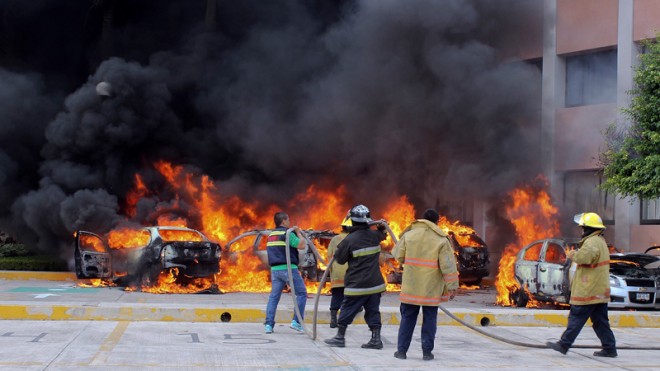Violent protests hit Acapulco’s tourism

Firefighters try to extinguish burning vehicles in front of the state congress building after protesting teachers torched them in the state capital city of Chilpancingo, Mexico, Wednesday Nov. 12, 2014. Violent protests over the disappearance of 43 college students continue and are now threatening tourism in the nearby resort city ofAcapulco ahead of a major holiday weekend when Mexicans traditionally flock to the beach, business leaders said Wednesday. Investigators say the 43 students from a rural teachers college were rounded up by local police, turned over to a drug gang and apparently killed, their corpses charred into ash and dumped into a river. (AP Photo/Alejandrino Gonzalez)
MEXICO CITY — Mexico’s president has tried to keep the issue of violence issue separate from his focus on the economy, but the two are converging as violent protests over 43 disappeared students squelch tourism in Acapulco just before a major holiday weekend.
As Mexico prepares to commemorate its 1910 revolution Monday, hotels in the Pacific resort city have seen a wave of cancellations after demonstrators temporarily shut down the airport, blocked highways and attacked government and political offices in the southern state of Guerrero.
Acapulco hotel occupancy rates are currently at 20 percent, well short of the 85 percent expected for this long weekend when Mexicans typically flock to the beaches, Joaquin Badillo, president of the Employers’ Association for Guerrero state, said Wednesday.
More cancellations have been registered for Christmas week, the busiest time of the year for Acapulco tourism, and Badillo said one company that operates 10 hotels has cut about 200 temporary jobs in recent weeks.
“Seasonal employment in tourism is really being hurt,” Badillo said. “We’re talking about cleaning workers, security, bartenders, barkers, transportation.”
Article continues after this advertisementAcapulco’s beaches were semi-deserted Wednesday except for small groups of sunbathers in the city’s famous Gold Zone. The emblematic Papagayo, Condesa and Icacos beaches were all but empty.
Article continues after this advertisementThe Employers’ Association called for a six-month tax waiver to get local businesses through the crisis.
“With that, employees would not lack for salary and the businesses can maintain themselves in good shape,” Badillo said.
In decades past, Acapulco was a favored playground of Hollywood movie stars and other international travelers. While the city’s luster has faded, it remains an important draw for domestic tourists.
Organized crime’s influence has risen in recent years in both Acapulco and the rest of Guerrero state, accompanied by soaring homicide, kidnapping and other violent crime rates.
As recently as three years ago, 180 cruise ships docked in the city. So far in 2014, just five have made port calls, according to statistics from local business people.
Security concerns have also affected other business sectors.
Juvenal Becerra, head of a pharmacy trade association, pointed to a 20 percent downturn statewide. That includes $3.8 million in lost business in the last month just in the area around Iguala, where the 43 teachers college students disappeared on Sept. 26 following a police attack in which six people died.
“In Iguala and the communities that surround it, some pharmacies have cut hours. They open later and close earlier,” Becerra said. Organized gangs “never stopped charging extortion or kidnapping or assaults, but since the students disappeared in September, clients leave home less often.”
Investigators say the students were rounded up by local police, turned over to a drug gang and apparently killed, with their corpses charred into ash and dumped into a river.
Authorities have yet to confirm that any human remains found during the search for the youths belong to the students, and officially they are still considered missing.
On Oct. 17, tens of thousands of protesters marched through Acapulco. On Monday, they blocked the city’s airport for hours carrying clubs, machetes and gasoline bombs. The following day, demonstrators burned the local headquarters of President Enrique Pena Nieto’s Institutional Revolutionary Party in the state capital of Chilpancingo. On Wednesday, the state legislature and an educational building were set on fire.
A dozen state business groups led by the Tourist Hotels Association issued a statement last week recognizing that the protesters have a legitimate demand for justice and urging authorities to clarify the case.
But the statement also criticized what it called “conditions of civil disorder, panic, damage to private property, vandalism, looting, the blockading of roads resulting from the total absence of public order.”
“It all started when the (Oct. 17) mega-march was announced,” Badillo said. “Then came the invasion of the airport on Monday, and the announcement of more marches, and everything falls apart.”